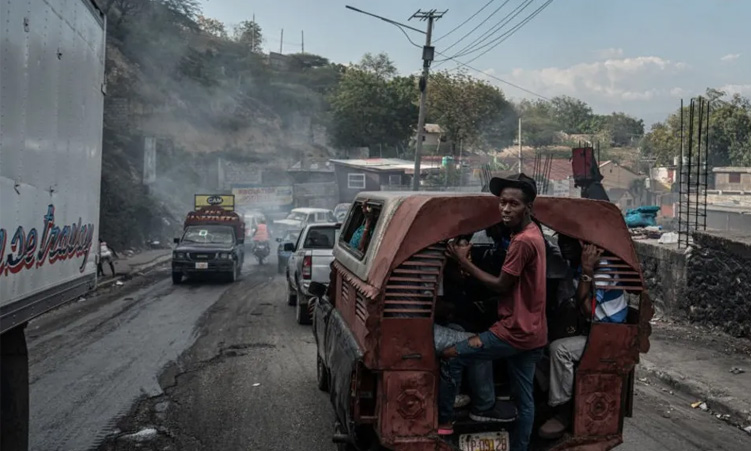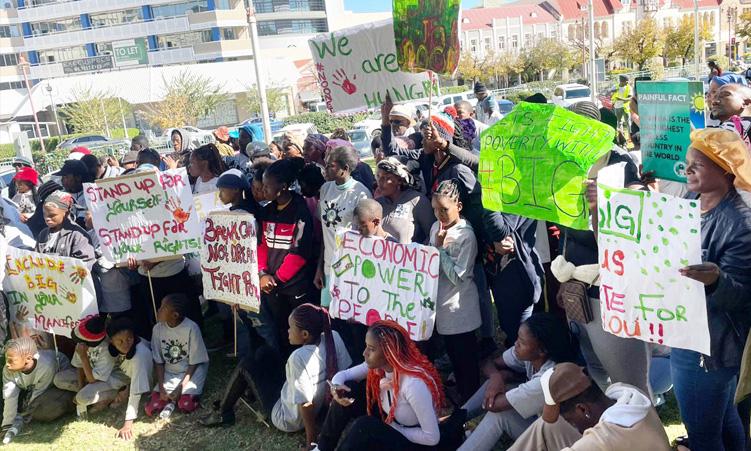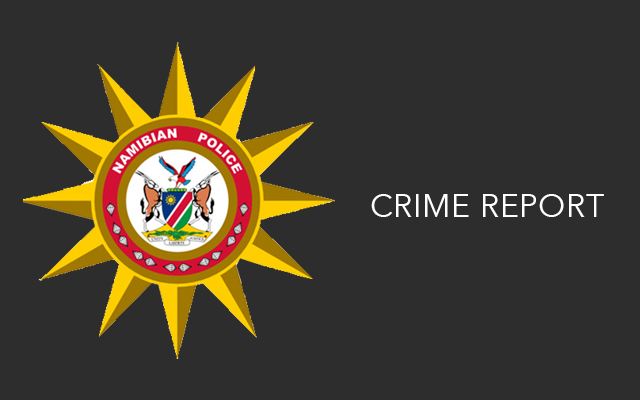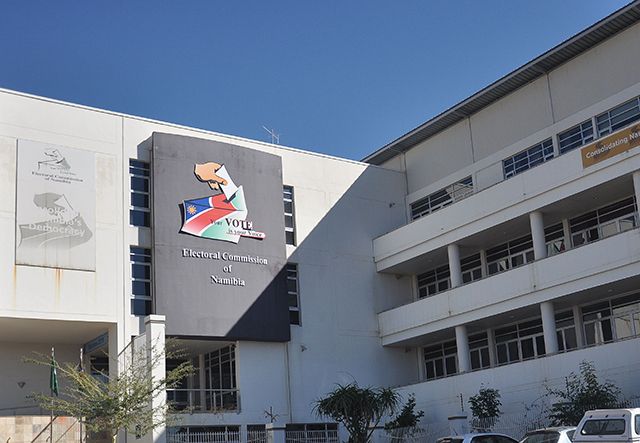As the passengers from Port-au-Prince disembark at the bus terminal in Cap-Haitien, the harrowing journey is evident on their faces.
The trip out of the beleaguered Haitian capital city involves running the gauntlet along risky and dangerous roads, trying to avoid gunmen and sporadic violence along the way.
“It took us several hours longer than it should as we had to reroute from the gang checkpoints along the way and there was gunfire”, says one passenger, who didn’t give his name and was clearly shaken by the experience.
Haiti’s already precarious situation has quickly deteriorated over the past weeks as gangs launched co-ordinated attacks on key facilities, forcing the resignation of the country’s prime minister.
In total, more than 360,000 people have been internally displaced.
To seek refuge from the chaos, many have come to Cap-Haitien, a coastal city in the north of Haiti.
In truth, Cap-Haitien suffers from almost all of Haiti’s deepest problems: grinding poverty, chaos, disorder and corruption. But crucially, not gang violence.
As such, it’s fast becoming the country’s main safe haven for people forced to leave their homes.
Phanel Pierre made the same treacherous bus journey six months ago.
It’s almost impossible to pull yourself from poverty in Haiti. Somehow, through years of hard graft creating an import business for construction materials, Phanel managed it.
But becoming a middle-class businessman also made him a target for the gangs. They destroyed his business, ransacked his house and tried to kidnap him. In doing so, they plunged him and his family back into poverty.
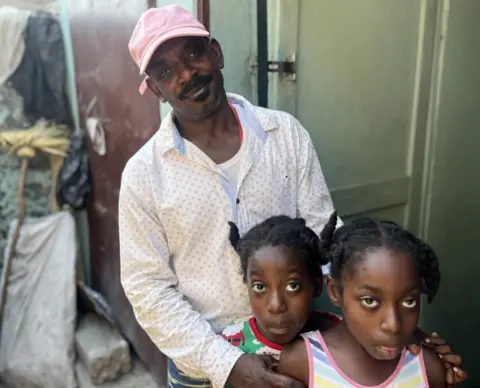
The 53-year-old shows us the tiny breezeblock shack he shares with his wife, his two youngest children and his mother-in-law. It is a far cry from the seven-room home he built in Port-au-Prince.
“This is just 2% of the life I used to live,” he laments. “In fact, I’m not living, I’m just existing.”
He pulls up a photograph of a younger, healthier-looking version of himself from a few years ago on his phone. The stress has affected his health, he says, and his children haven’t been able to enrol in school in their new city.
After the gangs took so much from him, Phanel is an advocate for an extreme solution to the country’s security problem.
“We need a long-term intervention. Not just one or two thousand police”, he says, referring the planned deployment of a 1,000-strong Kenyan-led security force in Haiti.
Rather, he thinks the solution will involve tens of thousands of personnel over a period of years. He heralded the hard-line anti-gang strategy of El Salvador’s President, Nayib Bukele, as a blueprint for Haiti.
Still, even if Phanel got his wish, the task to restabilise Haiti is daunting.
One of Haiti’s most powerful gangs, Unite Village de Dieu, has released a slickly produced but terrifying video, currently circulating online. It shows a well-armed militia, dressed in black combat gear, prepared to take on the Haitian state and any international force which might be deployed here. Little wonder the number of internally displaced people is rising.
A country in crisis
While Haiti’s security situation is that of a failed state, so are its politics.
Youri Latortue was the head of the Senate and is currently under US sanctions for alleged links to drug trafficking and armed criminal gangs.
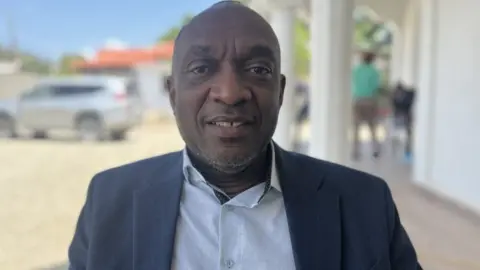
In a leaked cable from the US ambassador some years ago, Mr Latortue was described as “one of the most brazenly corrupt leading Haitian politicians” – an ignominious title which he robustly denies.
Rather, he points the finger of blame at the outgoing administration of the recently deposed prime minister, Ariel Henry.
“We have anarchy because the gangs have become another institution of the state,” he says.
“The government works with the gangs”, he adds bluntly. “This is the problem. During the past three or four years, the government has always, always worked with the gangs. So, the police can’t do anything.”
I put it to him that he is accused of the same thing. Indeed, of worse: trafficking cocaine from Colombia to Haiti.
He shrugged the allegation off and instead issued a warning to Washington.
“Don’t come and try to do everything,” he says, recalling the mishandled global response to the devastating 2010 earthquake.
“We need help from outside, from the international community. But Haitians themselves must do the big effort. Let’s work together.”
Mr Latortue thinks the US, Canada, France and others need to talk to politicians not aligned to the previous administration to find a route out of the current mess.
A route out of the mess also what Brian Kontz was looking for.
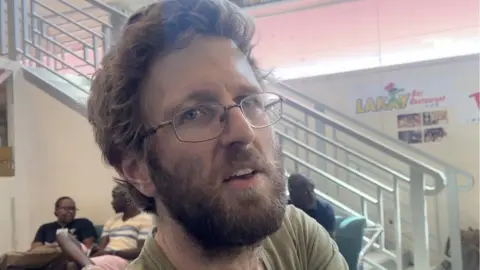
Mr Kontz said he hasn’t been frightened these past few weeks as he worked as an agricultural scientist in the north of the country.
But, sitting in the departures lounge of Cap-Haitien’s international airport shortly before boarding a charter flight to Florida organised for Americans stuck in Haiti by the US State Department, he said it was time to leave.
“Two weeks ago, when my flight was suddenly cancelled,” Mr Kontz explains, “that flight had been scheduled more than a month early. So, I have work to get back to the US”.
He had been looking at other routes, including with church missionary flights, when the State Department announced its charter.
“But this is not an emergency for me,” he explains.
Flying out of Haiti is a luxury, of course, which isn’t extended to millions of Haitians for whom the situation is most certainly an emergency.
In fact, it’s Haiti’s biggest humanitarian emergency in many years.
Yet aid is still only trickling in. Getting into a country mired in crisis, whose main international airport and land crossings remain closed, is presenting huge challenges for those who would help.
Hunger in Haiti is worsening. Hundreds of thousands are facing famine-like conditions unless there is a massive and co-ordinated response soon.
At the border with the Dominican Republic, there are huge tailbacks of traders who can cross into the neighbouring nation for the day to buy urgently needed supplies, even if they must physically carry them into Haiti.
Additional reporting by Alexander Lederman
Stay informed with The Namibian – your source for credible journalism. Get in-depth reporting and opinions for
only N$85 a month. Invest in journalism, invest in democracy –
Subscribe Now!


